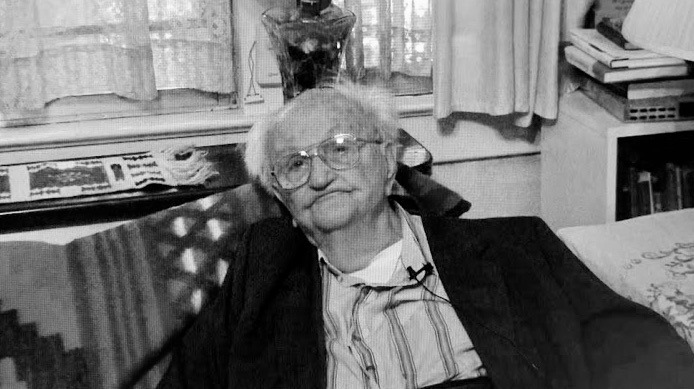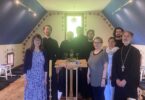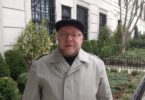This is the third piece of the trilogy Christmas with Vladyka Lavr: 1) About Myself; 2) About the Church in Russia.
From the author
These reminiscences by Mikhail Mikhailovich Zarechniak, Vladyka Lavr’s fellow countryman, who had known him personally as Vasia Shkurla and his entire family, is the third part of the trilogy “Christmas with Vladyka Lavr” featured on this site. I videotaped Mr. Zarechniak’s reminiscences in Washington in 2014. Fr. Victor Potapov took me to the home of Metropolitan Lavr’s childhood friend. Mikhail Mikhailovich is one of the oldest parishioners of St. John the Baptist Church, and Fr. Victor knew that Mikhail Mikhailovich could tell much that is interesting about Vladyka Lavr and the complex upheavals of the Russian immigrants in the years of the Second World War. What I heard exceeded all expectations. Here is merely a brief excerpt from our three-hour conversation about the Carpatho-Russians, the Second World War, the Union of Laboring Youth, intelligence work in the Soviet rear, and encounters with Vlasov… At some point, these priceless reminiscences of little-known pages of history will become accessible to the general public. Recounting his childhood in a small Slovak village, Mikhail Mikhailovich Zarechniak recalled that life was hard, there was little work, and many peasants were impoverished. The Shkurlas were very poor, and possibly the father had little Vasia live at the monastery not only for religious reasons… But the future Vladyka Lavr didn’t understand all of this, but was joyful that it was good for him at the monastery. His father’s decision turned out to be to the boy’s liking.
Our conversation took place in Washington in 2014. Mikhail Mikhailovich Zarechniak tells his story in his cozy house in the center of Washington with his characteristic humor, in spite of the serious nature of our conversation.
Maria Reshetnikova
So, how did Vladyka Lavr and I get to know each other? I was living in Eastern Slovakia in the village of Vydran, and I heard that everyone who had the possibility could gather at the Orthodox monastery. We needed to spend the night somewhere, and the monastery had a separate house for visitors, and we were able to stay there overnight and eat in their refectory. When Vladyka Lavr was born and was a little boy his parents were so poor that they couldn’t provide for him and gave him away to the monastery so that the monastery would care for him, and in that way he began his spiritual career. And when I first came to the monastery he was about eleven or twelve… I’m slightly older than him. And we started getting to know each other, telling each other where we were from, who we were… and, most important, we started serving in church. It quickly became clear that he was drawn toward church work. First he joined the choir and then became a monk. And when he left his parents none of his kinfolk wept because, as I already said, it was very hard for them to provide for him. And from among the other monks he drew attention by his politeness and affability, it was easy to approach him, to talk with him, to tell him something, or to seek his advice on what we should do… In that sense he enjoyed, well, we could say, success, yes? And so we would meet each other from year to year in the summer, since after summer vacation it was time to return to school and I would go away to school and he would stay there. ─ What year was that, Mikhail Mikhailovich? ─ Let me figure it out… I was born in 1920, and I was fourteen… that means it was 1934, you figure it out… The village where I lived was divided into three sections: the upper, the middle, and the lower. The really poor people lived in the upper section. And the rich, according to village standards, lived in the middle section. And the south section, the lower one, was where all kinds of people lived, however they could. My last name, Zarechniak, means “the one who lives beyond the river, someone of no importance… And it was possible to work for people in the middle section, milking cows of feeding pigs. It didn’t matter what the work was. I didn’t spurn work, and because of this people got used to me and would invite me to do this work for them. Whenever I would bring this money home to Mom, she would be very glad, saying that things would be better for us since I was already a worker.
Here is an excerpt from M. M. Zarechniak’s manuscript: “A boy lived then in a neighboring village, the future Vladyka Lavr, whom his parents handed over to the Vladimirovo Monastery. I would visit that monastery with a group of young people and would pray there.”
Tell me, Mikhail Mikhailovich, so Vladyka Lavr’s family was even poorer than yours?
─ It was poor, so poor that it couldn’t provide for him.
There was no work in those parts?
─ That’s right, there were no jobs in Vladomirovo that could earn my dad some money
Fr. Victor Potapov joins the conversation, asking Mikhail Mikhailovich, the oldest parishioner of his numerous flock:
Were you often at the monastery in Vladimirovo?
─ Yes, pretty often. I tried to be there almost each summer. When we would be let out for two months I would try to go to the monastery alone or with friends. And we could stay in the guest house. We also would do something ─chopping wood, cleaning, carting… But what was most important was that we were present at all of the services.
Our conversation turns a bit away from Vladyka Lavr’s childhood. Mikhail Mikhailovich shares his reminiscences of those distant years when life was hard and many children worked, helping their parents, but there were no political repressions in Slovakia… Mikhail Mikhailovich explains:
─ Slovakia was a democratic country, and news about repressions in the Soviet Union was reaching us. We had immigrants who would tell us about them… We thought that the Russian people wished to live that way themselves, but we were told that it wasn’t quite like that, that this was imposed upon the Russian people from above, and, little by little, we started understanding what Communism was…
Mikhail Mikhailovich Zarechniak’s detailed account of the life of Carpatho-Russians under the Austro-Hungarian Empire in those complex years should be published separately. At this point I will quote just a small excerpt from his book which corresponds to Vladyka Lavr’s reminiscences of Orthodoxy being persecuted and of the Rusyns’ ardent desire to return to their religious roots precisely at the time when the once great Orthodox Russia which they had honored so much was drowning in the bloody atheism of the new Communist regime. Here is what Zarechniak’s manuscript says:
I was born in Carpathian Rus’. The concept of Carpathian Rus’ consists of a few parts: Galicia, Presov, and Subcarpathian Rus’. The Presov region is he Northeastern part of Slovakia, in which the Laborec River, named for Prince Laborec, flows. The name of my village, Vydran, comes from the word for “otter.” It was in the area of Laborec, which was the district town. Our village church was dedicated to the Archangel Michael. It was Greek Catholic and under the Pope, although the services were according to the Orthodox rite. The village population was about 600. My dad was a Rusyn from Galician Rus’, which at the time was a part of Poland where Orthodox were living, and which is now part of the Ukraine. There were Russian immigrants among the parishioners who had fled from the Soviet Union after the Revolution… And I remember one of them very well, that was Dmitri Petrovich Sevastianov, who lived alone in a house, but the peasants brought him food every day. I was personally acquainted with him, and he helped me perfect my Russian. Eventually I enrolled in the Russian high school in Prague, where I was with the children of Russian immigrants. They called me a Rusyn, and I called them moskali /Muscovites/. Later I enrolled in the Bratislava State University, majoring in philology. It was there that I found out the details of the Greek Catholic Church and understood that the Pope actually heads this Church. I discovered a lot and in this way I understood that we had been somewhat deceived, and so I decided to convert to Orthodoxy. I went to the hall of records and officially corrected my documents, saying that I was changing from the Greek Catholic to the Orthodox Faith. I was the first in my village to take this step. My mom wept because of this, since she was afraid that there would be repressions, but God preserved me and there weren’t any.
Fr. Victor Potapov: But did you frequently meet with Vladyka Lavr later on?
─ Oh yes!
You were reminiscing about the old days?
─ Even now, when he came here, to this house, shortly before his death, we recalled one thing after another, how things went, how the Lord blessed us! In particular, the issue of church reunification was always a very acute concern for us, since the appellation “Church Abroad” appeared to us Rusyns as some kind of misunderstanding. Why are not simply the Russian Church? That word “Abroad”… When the negotiations got started Vladyka Lavr said that he didn’t sleep so many nights, praying to God for the reunification to take place…
At these words Mikhail Mikhailovich came close to tears… Indeed, God’s providence illumined the destinies of these two fellow countrymen, Vladyka Lavr and Mikhail Zarechniak, formerly village boys from poor Carpatho-Russian villages, where the Orthodox Faith was outside the law. They experienced separation from their native land, the war years, and came to know life in a foreign land. They went their separate ways for a certain period but years later the fellow countrymen met again and no longer lost contact till the final days. Mikhail Mikhailovich outlived Vladyka Lavr, and, judging from his reminiscences, missed him very much… Gathering up his strength, he continued:
─ And finally the reunification took place successfully… And Vladyka Lavr felt literally that now he could die… And over there where he lived, he lived separately, not all the way in the woods, but by the woods, and he would cover his face with a mask so that all kinds of bugs wouldn’t get in and bite him…
Are you talking about Jordanville, Mikhail Mikhailovich?
─ Yes… He told me that he prayed before this whole reunification. Then we recalled the past years, how Vladyka directed the Church, how that was difficult…
Vladyka Lavr began his life’s journey practically as an orphan, probably not foreseeing that God would prepare for him such a large role in history ─ becoming the head of the Orthodox Church Abroad and then directing the reunification of Churches… This was a huge historical responsibility that fell to his lot! With the start of the Second World War your entire patriarchal life in the village unfortunately came to an end and a life of refugees came in its place… So where, at what moment, was Vladyka Lavr’s mission manifest, do you think?
─ At first it seemed to me that he was simply a monk… He would come for a visit, I would greet him, and he would pray for me… And these political issues, this was always politics for us, since we always regarded Moscow as a real Orthodox Church… And I could see that he kept silent about this, he wouldn’t say anything… It seemed to us that he was such a monk who felt that there’s one Church on earth.
At these words tears again appeared in his eyes.
─ It always affects me when I recall how he would lift his arms, saying “There’s one God on earth and one Orthodoxy.” So then it became clear to me that there was no need to ask him about this, that this issue would be resolved in some way. And it was resolved. So now, after all of that had happened, and it happened long before his death, he could die in peace. For what he had wished for, a unified Church, actually happened!.. He died, and there was no one with him…
I’m glad that you shared these reminiscences, because I also had the honor of personally finding out Vladyka Lavr’s opinion of the church reunification and thus it was very unpleasant to listen when rumors were being circulated that Vladyka Lavr was allegedly acting not according to his free will.
Again, tears appeared in his eyes as he recalled that troubled period of spiritual trials that fell to the lot of Metropolitan Lavr and his sympathizers
─ With many he felt too shy to say openly what he thought… He had to be cautious, open with some and reserved with others.
When did you first renew your postwar personal visits with Vladyka Lavr?
─ When I was already completing my university studies in Bratislava someone wrote to me, “Your Lavr has already become a bishop”! He was human like I was, and yet he became a bishop! So I went then to church to see how he prayed, and saw that he was praying with authority! In that sense he reminded me of John of Shanghai, who was barefoot, but when he looked at you, he pierced you entirely with his eyes, and in that sense it was frightening to be with him, since you felt worthless… He didn’t give you the chance to play the fool, to tell tales… That’s why I wanted to meet Lavr again, and I saw that he was unlike John of Shanghai in that sense… I saw that he was as before, a quiet, calm, thinking person with a deep faith in God! And God is one, and we must try to do as much as possible to save our souls. So the issue of souls took precedence and one could easily discuss anything with him.
At that point Fr. Victor Potapov shared his reminiscences:
─ Speaking of decisiveness… I remember that soon after his election Vladyka Lavr was on the West Coast at some pastoral gathering. One of the priests called me from Seattle and said that Vladyka Lavr openly declared that we had to reunite. This astounded me and made me so happy, since it was apparent that this idea had come to fruition long before, back when Vladyka Vitalii was alive. He had simply kept silent, apparently waiting for his moment to come.
Father Victor deeply reveres St. John of Shanghai. The Church of St. John the Baptist, whose rector he is, was founded by Vladyka John in the fifties, and of course I wanted to know whether Vladyka John knew the future Metropolitan Lavr and what his attitude would have been to the reunification of the Moscow Patriarchate and the Church Abroad… Here is what Fr. Victor said:
─ I am convinced that Archbishop John, had he lived to this day, would have been the first to vote for reunification, since his ideology was healthy and Orthodox, and he understood that the time would come when the Church Abroad would lose any justification for its independent existence. He writes about this in his history of the Church Abroad, saying that it bears a temporary nature… So Vladyka John would definitely have been on Vladyka Lavr’s side.
Did Vladyka Lavr and Vladyka John ever meet each other?
─ Of course they did! Vladyko John came many times to Jordanville, to Bishops’ Councils, and to Mahopac, where the Council also gathered. And he would visit Jordanville without fail, while Vladyka Lavr spent all of his life, at least most of it, in Jordanville. He and Vladyka John would meet, and he even served as his subdeacon.
Do we know Vladyka Lavr’s attitude toward the time when Vladyka John was being persecuted?
Father Victor: ─ I know that Archbishop Averkii, who was superior of the Jordanville Monastery, was solidly behind Vladyka John. And Vladyka Averkii had great influence over all the monks in Jordanville, so I am certain that Vladyka Lavr likewise supported Vladyka John in this case.
Toward the end our conversation returned to reminiscences of Carpathian Rus’. Of course, one couldn’t help noticing the particular color of the speech and humor characteristic of both fellow Rusyns, Vladyka Lavr and Mikhail Zarechniak. Father Victor asked:
Did you speak with Vladyka Lavr in Carpathian?
─ No. We would insert individual words in order to emphasize something… using our local dialect.
At this point, Mikhail Mikhailovich said in Carpathian that he was glad to have met me. That language sounds a lot like Ukrainian or Belorussian.
─ Yes, that’s our dialect. Some of the words aren’t quite decent, but if you wish to emphasize something you might say it!
These are reminiscences of Mr. M. M. Zarechniak complete the details in the story of Vladyka Lavr’s childhood and youth and of those complicated conditions under which the raising and formation of the future metropolitan were taking place. It was difficult for Vladyka himself to recall all of these distant years, but thanks to the unique record of the memoirs of his childhood friend and fellow countryman we can have a fuller picture of the complex fate of Metropolitan Lavr.
LINKS
Archpriest Victor Boldewdeskul, “Vladyka Lavr Truly Loved the Church”
Protodeacon Victor Lochmatow, “Metropolitan Laurus Led the Church by His Humility”
Reader Alexey Axionov, “He Who Conquered With Love”











